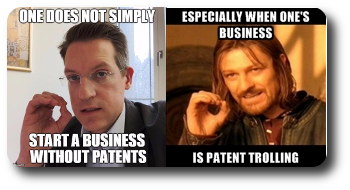

SOFTWARE patents are an important topic. There are literally billions of dollars at stake, as the case of Apple against Android/Linux serves to show (usually it's only the lawyers who win irrespective of the outcome). Depending on the law regarding software patents, billions of dollars can be diverted away from developers and fall into the hands of large corporations and their patent lawyers, shareholders, etc. There is therefore a "class war" element to it. As more and more of society goes digital and more aspects or life get digitised, this matter becomes increasingly urgent. Can a non-exact expression of ideas in code (not the same in copyrights) be "owned"? Should it? Is it feasible and enforceable at all?
"Depending on the law regarding software patents, billions of dollars can be diverted away from developers and fall into the hands of large corporations and their patent lawyers, shareholders, etc."A new article titled "First Black Woman Ever to Hold a Software Patent" was mentioned by both opponents and proponents of software patents [1, 2] (as expected, the former is a programmer, the latter is a patent lawyer). We very much doubt the claim in this headline is true as there are many black women who work as programmers in the US (at least hundreds if not several thousands) and many companies in the US apply for software patents nowadays. Putting that dubious/questionable claim aside (we doubt they have a complete USPTO database with ethnicity and gender of applicants/grantees in it), one can easily see who's involved in this battle. The patent lawyer in this case I'm lucky to have a reasonably amicable channel of communications/relations with. He habitually visits the EPO, where even visitors have been subjected to highly intrusive surveillance which almost certainly violates German law. His name is Bastian Best (photo at the top) and he is based in Germany, where the UPC affairs reek a great deal. Mr. Best recently told me about this blog post of his, in which he talks about software patents in Germany (not necessarily in Europe as a whole). To quote Best: "Patent protection in Germany can be obtained either nationally by filing a national German patent application with the German Patent and Trademark Office or by designating Germany in a European patent application and subsequently validating the granted European patent in Germany. This post is restricted to German patent applications that have been filed nationally. The provisions of the EPC and the case law of the EPO concerning software are discussed in other places of this blog."
Well, it is widely agreed by many that under the provisions of the EPC software patents are simply not allowed, but let's brush that aside for a moment. Best doesn't always know best. He is a little biased, like all patent lawyers. It's hard to betray one's source of salaries.
"As more and more of society goes digital and more aspects or life get digitised, this matter becomes increasingly urgent."Looking at what happens in the US, it's not looking too good for software patents this week. "Federal Circuit Court of Appeals [CAFC] to Decide The Status of MacroPoint Patent Dispute with Fourkites" says this headline and a patent lawyer says: "This outfit (MacroPoint) thinks its freight tracking software #patents can survive #Alice v. CLS Bank challenge" (we have mentioned MacroPoint's patent attacks at least twice in the past [1, 2]).
Meanwhile, acknowledges a patent lawyer, "US Pat 7,096,003, S.Ct. Denied Cert; 101/Alice Kill Stands" (so Alice does it again). This is part of a longstanding trend in the US. A patent lawyer, writing at a pro-software patents advocacy site, is trying to dodge the Alice case (and the new rules it led to) in order to patent software anyway. It's somewhat pathetic to watch. They still refuse to grasp or accept a decision from their highest court. ⬆